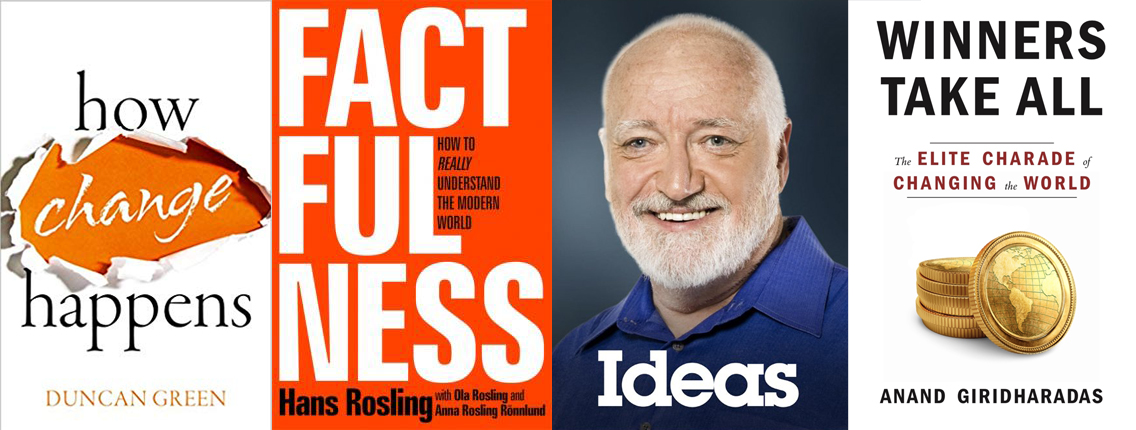Our Sustainable Development Holiday Reading List
Looking for a book or podcast on sustainable development to enjoy during the holidays? The IISD team has your holiday reading list ready.
As 2018 draws to a close and many of us enjoy our holidays, you may finally find yourself with spare time to enjoy a book or podcast on sustainable development.
We asked the IISD team to share some of their favourite reads and listens on the issues we cover in our work. We hope you enjoy our holiday reading list—and all the best to you in 2019.

Factfulness: Ten Reasons We're Wrong About the World – and Why Things Are Better Than You Think
by Hans Rosling, Ola Rosling, Anna Rosling Rönnlund
I really enjoyed this book because it challenges our views of development and progress—and because the world is changing and we need to keep up. The book covers a broad range of progress indicators linked to development and the SDGs and asks how much we really know about what is happening in the world based on "facts" as opposed to our "perceptions" about the “third world.” My whole family learned a great deal from this book, including how globally the number of guitars per household is going up (great!) and the relative lack of progress on climate change. — Laura Merrill, Senior Policy Advisor and Manager of Global Subsidies Initiative
Podcast: Data for Social Good
by Anik See for CBC Ideas
This CBC Ideas podcast on Data For Social Good is full of inspiring stories of how individuals are using public data to change how we see and understand the world, and find creative solutions to everyday problems. Stories range from mapping Mexico City’s informal bus routes to more accurately reporting fishing numbers in the Bahamas. A great listen while wrapping presents! — Jennifer Temmer, Project Manager with SDG Knowledge team
Winners Take All: The Elite Charade of Changing the World
by Anand Giridharadas
“I sit on a man’s back choking him and making him carry me, and yet assure myself and others that I am sorry for him and wish to lighten his load by all means possible … except by getting off his back.” Giridharadas opens his book with this provocative quote by Leo Tolstoy. Throughout the book we follow well-meaning do-gooders—mostly wealthy and successful—and learn about their initiatives for changing the world. But aren’t we just fooling ourselves? Won’t these initiatives do just the opposite and keep us from aspiring change at a more fundamental level? — Nathalie Bernasconi, Group Director of Economic Law & Policy Program
How Change Happens
by Duncan Green
This book does a great job of introducing the concepts of "Systems Change" and "Complexity" into the context of sustainable development and shows how these ideas can be used practically to deliver greater impact. — Kali Taylor, Project Officer, SDG Knowledge Program
You might also be interested in
UN Tax Convention: What happened at recent negotiations, and what’s next?
This article analyzes key decisions made at the latest round of negotiations for a UN Convention on Tax and explores how the convention can be most effective tackling the challenges of developing countries.
Canada OKs 'Massive' $20 Billion Loan for Trans-Mountain Pipeline
The Canadian government quietly approved a staggering $20 billion loan to support the Trans-Mountain Expansion (TMX) pipeline. "At a time when Canada should be accelerating its clean energy transition, providing $20 billion in public financing for the TMX pipeline is a step in the wrong direction," IISD's Laura Cameron says.
Revisiting Investment Contracts Efficiency
IISD's Josef Ostřanský talks about investment contracts and treaties with Tanzanian Broadcasting Corporation.
Kigali Shares Lessons on Flood Risk Reduction and Gender Equality With Other Sub-Saharan African Cities
KIGALI, RWANDA—Representatives from 14 organizations and city governments delivering the USD 21 million SUNCASA project will meet in Kigali this week to exchange experiences and insights on advancing nature-based solutions (NbS) for reducing flood and climate risk while improving the lives of women and vulnerable groups.
